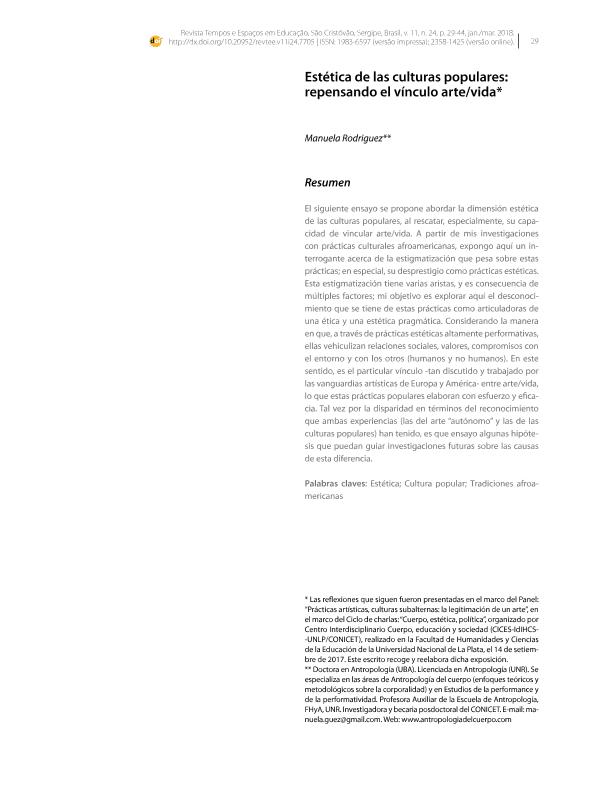Mostrar el registro sencillo del ítem
dc.contributor.author
Rodriguez, Manuela

dc.date.available
2020-02-26T17:52:23Z
dc.date.issued
2018-01
dc.identifier.citation
Rodriguez, Manuela; Estética de las culturas populares: repensando el vínculo arte/vida; Universidade Federal de Sergipe. Núcleo de Pós-Graduação em Educação; Revista Tempos e Espaços em Educação; 11; 24; 1-2018; 29-44
dc.identifier.issn
1983-6597
dc.identifier.uri
http://hdl.handle.net/11336/98436
dc.description.abstract
El siguiente ensayo se propone abordar la dimensión estética de las culturas populares, al rescatar, especialmente, su capacidad de vincular arte/vida. A partir de mis investigaciones con prácticas culturales afroamericanas, expongo aquí un interrogante acerca de la estigmatización que pesa sobre estas prácticas; en especial, su desprestigio como prácticas estéticas. Esta estigmatización tiene varias aristas, y es consecuencia de múltiples factores; mi objetivo es explorar aquí el desconocimiento que se tiene de estas prácticas como articuladoras de una ética y una estética pragmática. Considerando la manera en que, a través de prácticas estéticas altamente performativas, ellas vehiculizan relaciones sociales, valores, compromisos con el entorno y con los otros (humanos y no humanos). En este sentido, es el particular vínculo -tan discutido y trabajado por las vanguardias artísticas de Europa y América- entre arte/vida, lo que estas prácticas populares elaboran con esfuerzo y eficacia. Tal vez por la disparidad en términos del reconocimiento que ambas experiencias (las del arte “autónomo” y las de las culturas populares) han tenido, es que ensayo algunas hipótesis que puedan guiar investigaciones futuras sobre las causas de esta diferencia.
dc.description.abstract
The following essay aims to address the aesthetic dimension of popular cultures by rescuing, especially, their ability to link art/ life. From my research with African-American cultural practices, I expose here a question about the stigmatization that weighs on these practices; especially, its discredit as aesthetic practices. This stigmatization has several edges, and is a consequence of multiple factors; my objective is to explore here the ignorance that one has of these practices as articulators of an ethics and a pragmatic aesthetic. Considering the manner in which, through highly performative aesthetic practices, they convey social relationships, values, commitments to the environment and to others (human and non-human). In this sense, it is the particular link - so discussed and worked by the artistic vanguards of Europe and America - between art / life, what these popular practices elaborate with effort and efficacy. Perhaps because of the disparity in terms of the recognition that both experiences (those of “autonomous” art and those of popular cultures) have had, is that I test some hypotheses that can guide future research on the causes of this difference
dc.format
application/pdf
dc.language.iso
spa
dc.publisher
Universidade Federal de Sergipe. Núcleo de Pós-Graduação em Educação
dc.rights
info:eu-repo/semantics/openAccess
dc.rights.uri
https://creativecommons.org/licenses/by/2.5/ar/
dc.subject
ARTE
dc.subject
ESTÉTICA
dc.subject
CULTURA POPULAR
dc.subject
TRADICIONES AFROAMERICANAS
dc.subject.classification
Antropología, Etnología

dc.subject.classification
Sociología

dc.subject.classification
CIENCIAS SOCIALES

dc.title
Estética de las culturas populares: repensando el vínculo arte/vida
dc.title
Aesthetics of popular cultures: rethinking the art/life link
dc.type
info:eu-repo/semantics/article
dc.type
info:ar-repo/semantics/artículo
dc.type
info:eu-repo/semantics/publishedVersion
dc.date.updated
2019-12-10T16:48:04Z
dc.identifier.eissn
2358-1425
dc.journal.volume
11
dc.journal.number
24
dc.journal.pagination
29-44
dc.journal.pais
Brasil

dc.journal.ciudad
Sergipe
dc.description.fil
Fil: Rodriguez, Manuela. Consejo Nacional de Investigaciones Científicas y Técnicas. Centro Científico Tecnológico Conicet - Rosario; Argentina. Universidad Nacional de Rosario. Facultad de Humanidades y Artes. Escuela de Antropología. Departamento de Antropología Sociocultural; Argentina
dc.journal.title
Revista Tempos e Espaços em Educação
dc.relation.alternativeid
info:eu-repo/semantics/altIdentifier/doi/https://seer.ufs.br/index.php/revtee/article/view/7705
dc.relation.alternativeid
info:eu-repo/semantics/altIdentifier/doi/https://doi.org/10.20952/revtee.v11i24.7705
Archivos asociados
